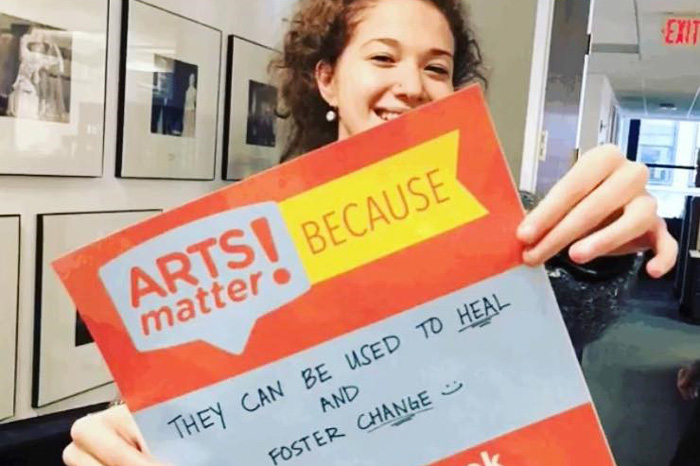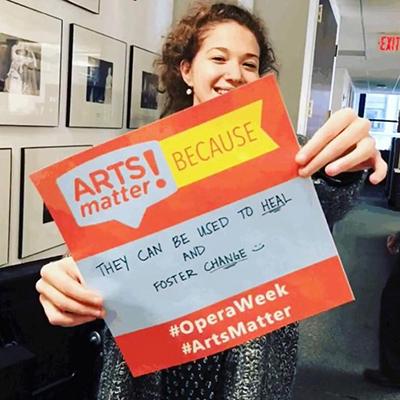Merging Art and Civic Engagement

Sarah Zimmer '17

Former history and theatre arts major Sarah Zimmer ’17 shares her love of theatre while working in community engagement as an intern for the Boston Lyric Opera, where she writes educational study guides and helps to bring opera to the Boston Public Schools.
Can you speak to how Dickinson’s useful liberal-arts education has helped you in your work?
The ability to both double major in history and theatre arts as well as take other courses such as Reproductive Justice in the Department of Women’s & Gender Studies or Music History in the Department of Music was critical for me. I now work across all these fields. I’ve done everything from writing educational study guides for Boston Lyric Opera to working on a project focusing on consent in rehearsal rooms and film sets at Emerson College. Apart from these content areas, in community engagement, which is broadly what I do, it’s extremely valuable to understand all the historical and social complexities that make up cities, towns, colleges and other structures, and try to devise the best way to support these places and people, which could range from theatre to music, to addressing underlying resource or inequity issues. That’s about as interdisciplinary as it gets, and I’m very grateful to have had Dickinson’s foundation especially in my field.
What was your favorite activity/organization at Dickinson?
Being a part of the student theatre group the Mermaid Players and performing in Main Stage shows with the Department of Theatre & Dance. Since I’ve left college and moved to a city, performance opportunities are much less accessible, and I really found myself on that (Mathers) stage with my professors and peers. It’s also a student group and department that really gave me the freedom to explore, create freely and lead the charge, which is what led me to discover theatre and community engagement to begin with.
What jumps out as a great memory from your time at Dickinson?
Meeting playwright John Patrick Shanley during my senior year. We got to go out to lunch at Café Bruges and chat about theatre. Incredible experience—wow!
How do you stay involved with/support Dickinson? Why do you think it’s important?
I am part of DAVS (Dickinson Alumni Volunteer Society) through which I conduct interviews in Boston for prospective students during the application season. I also serve on the Boston Alumni Regional Council, assisting in planning events in Boston since there is a huge alumni base here. Most importantly, though, I return to campus for my friends’ recitals and productions. I think it’s important to continue to engage with a community I feel so rooted in. I want to be a part of supporting it and making it better.
How did you get interested in your work, and what about it excites you most?
I’ve always been passionate about theatre, but I also began advocating in college for things I cared about, like mental health and domestic violence. Given freedom and advice from the Department of Theatre & Dance, I was able to explore merging theatre and engagement. I firmly believe art, and theatre specifically, is a powerful tool for social change in the broadest terms. It’s exciting to develop new methods to reach out to people through theatre to foster empathy and action in our mercurial present.
What does your current work entail?
I am currently finishing up my master’s at Emerson College in Theatre and Community Engagement. I’m working on two projects within the college, the first being integrating intimacy and consent practices in rehearsal spaces, running parallel to the college reevaluating how it deals with sexual harassment and violence on campus. I’m also beginning my capstone project, which will focus on mental health and meditation. I work a lot with the crossover between domestic and sexual violence and the arts, and just recently I assisted as an advocate for two operas that focus on these topics. I’ve also worked with kids quite a bit, ranging from preschoolers to high-schoolers in after-school programs, arts and advocacy programs, and summer camp musicals. I also set up benefits for a local restaurant, creating partnerships with nonprofits in the Allston-Brighton area. Of all the work I’ve done, I’ve most enjoyed my time at my current internship at Boston Lyric Opera, where I write educational study guides, bring opera to Boston Public Schools and help forge partnerships with nonprofits related to the topics of our operas. All in all, it’s a lot of relationship building and creative engagement.
What is the most challenging part of your work?
Doing a lot of different jobs and projects at one time. Most people working in this field are some combination of teaching artists, professors, activists, part-time administrators, full-time administrators, performers and so forth. Especially since I’m still in graduate school, I work a few different jobs and am always working on a few different projects inside and outside of school, so sometimes it can be overwhelming and logistically complex to give yourself to so many things at the same time.
What comes to mind as something unforgettable that you’ve done since you graduated?
Just this May, I got to meet Margaret Atwood, author of The Handmaid’s Tale. This was the culmination of an incredible yearlong internship at Boston Lyric Opera in their Education & Community Engagement Department. I got to write educational study guides for the operas for high school and college students, create a kid-friendly version of a classic Italian opera to tour across Boston schools, write blogs on topics surrounding the operas and watch the creation of a partnership between an artistic organization and two sexual violence service providers in Boston given the content of the final two operas. The Handmaid’s Tale (yes, an opera version) was the last show of their season and was presented on the Harvard campus, where Atwood originally imagined the book. Surreal.
You just built a time machine: where and when do you go?
Probably the romantic era of music composition, so late 19th, early 20th century. I would just love to go back in time and see Mahler or Tchaikovsky perform my favorite pieces for the first time.
If you could change one thing about your life, what would it be?
More time and less sleepiness.
TAKE THE NEXT STEPS
Published June 20, 2019